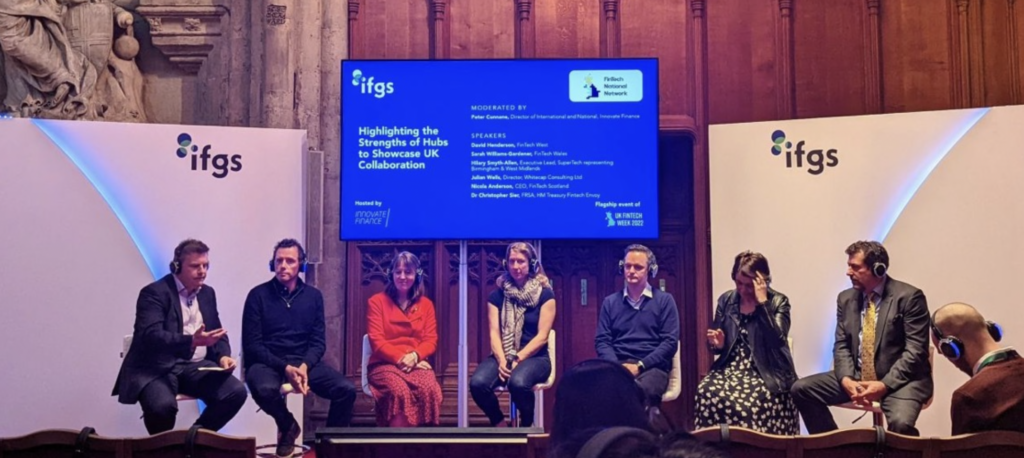 With more than 300 speakers across three stages and nearly 2000 attendees across two days, it is impossible to absorb everything that is covered at IFGS, but here are my six key takeaways from various sessions and conversations:
With more than 300 speakers across three stages and nearly 2000 attendees across two days, it is impossible to absorb everything that is covered at IFGS, but here are my six key takeaways from various sessions and conversations:
1. UK is officially ‘open’ for crypto
This was the main theme of John Glen’s address on day one of the conference. He outlined how the UK is going to embrace crypto and seek to become a global hub, including evolving the regulatory regime as required. The opportunity in this field is huge, and by 2030 it is estimated that 60% of consumers globally will have made a payment using an asset class other than a fiat currency. The full transcript of John Glen’s keynote can be found here.
In a later session focusing on cross border payments we heard about the importance of interoperability between new payments platforms and legacy payments ‘rails’, and how this is particularly going to be an issue relating to developments such as stablecoins.
2. Finding the right balance of innovation and regulation remains critical
“Over the next 10 years the sector will be defined by the balance between regulation and advances in technology”. These were the words of TS Anil, the CEO of Monzo, in one of the opening panel sessions. Getting the right balance of regulation and innovation was a key theme of several sessions, and of course the evolution of regulation will always be a key topic in a sector like FinTech which by its very nature is pushing the boundaries of the regulatory regimes globally.
3. Open finance & embedded finance are set for exponential growth
Open finance is about making things easier for consumers to access financial services via developments such as embedded finance, but it also needs careful regulation because it will also make it easier for consumers to make bad decisions if things are made much quicker. We recently heard the CMA’s recommendations for the future of open finance regulation, and this looks set to be a huge area of focus and debate across the financial services industry for the foreseeable future.
Intrinsically linked to open finance is the development of embedded finance, whereby non-financial organisations can embed the delivery of regulated financial services within their proposition. In essence, embedded finance gives any company the opportunity to be a FinTech, and can enhance the purchasing and check out process.
Embedded finance makes open banking relevant and valuable for all these companies, but there are other benefits such as cost savings. For example, changing the payment method from a card transaction to instant bank transfers via Open Banking will save retailers and consumers cost, as transaction fees will be avoided and this will be reflected in consumer prices.

4. Personalisation is increasingly mainstream
Personalisation was a hot topic, and the evolution of enhanced experiences through developments such as personalised user experiences and products can help ensure the pace of change in FinTech stays strong. Increased transparency and accessibility of data open up new opportunities for consumers and businesses, as well as creating whole new sectors and niches for FinTech firms to provide products and services. At the same time, speed and automation also risk making things less personal, which means we need to find the balance between an effective process and a personalised but considered experience.
5. The metaverse is coming to financial services
For a lot of people the main question here is a simple one: what is the metaverse and why is everyone so obsessed about it at the moment? The metaverse is a concept of a shared and immersive experience across the physical and virtual world. For the financial services sector, the metaverse is not only a virtual world, but also a virtual economy. People buy ‘land’, clothing and digital assets in the metaverse, as they invest in their presence and experiences there. Estimates vary but there could be anything from 1 – 5bn potential users of the metaverse, and a recent EY report estimated its value at $13 trillion. There could actually be lots of different metaverses (‘the multiverse’), which could be open (eg the next iteration of the internet, known as ‘web 3’) or closed (eg Meta, aka Facebook).
The metaverse is still at a stage where there is considerably more hype than action, but there are a growing number of examples of meaningful activity by established financial services brands (only this morning HSBC announced the creation of a dedicated metaverse investment fund). The challenge over the coming months is going to be navigating all the hype and zoning in on the tangible activity and its implications for FinTech and financial services.
6. Regional FinTech is now firmly on the national stage
There was a show of strength and togetherness from the FinTech National Network (FNN), with representatives of the regional clusters participating in a dedicated panel session hosted by Innovate Finance. The FNN includes FinTech North, FinTech Scotland, FinTech Wales, FinTechNI, FinTech West, SuperTechWM, and Innovate Finance.
It was great to have the opportunity to take part in this panel, which took place on the same day that the steering group for CFIT was announced. This group includes the CEOs of three organisations from the FNN, including Nicola Anderson and Sarah Williams-Gardner, from FinTech Scotland and FinTech Wales respectively, who will sit on the committee with a remit to represent the regional voice across all the regions of the UK. The official announcement of the creation of the CFIT Steering Committee can be found here.
As always, hats off to the Innovate Finance team for putting together and delivering a brilliant couple of days to kick off UK FinTech Week.

More FinTech insights from Whitecap Consulting:
- North East to develop 3 year FinTech strategy
- Open Finance data – the opportunity for FinTech Research & Innovation
- What is a FinTech Research & Innovation Roadmap and why is it so important?
- FinTech Scotland unveils the UK’s First Research and Innovation Ten Year Roadmap
- Open Banking…. how are we doing in the UK?
- Ensuring the future sustainability and competitiveness of regional FinTech clusters
- The transition of financial services to ESG and green finance
If you’d like to discuss this blog post or share your own perspective on the issues covered, please get in touch or comment via our social media channels on LinkedIn or Twitter .
Established in 2012, Whitecap Consulting is a regional strategy consultancy headquartered in Leeds, with offices in Manchester, Milton Keynes, Birmingham, Bristol and Newcastle. We typically work with boards, executives and investors of predominantly mid-sized organisations with a turnover of c£10m-£300m, helping clients analyse, develop and implement growth strategies. Also, we work with clients across a range of sectors including Financial Services, Technology, FinTech, Outsourcing, Consumer and Retail, Property, Healthcare, Higher Education, Logistics, Manufacturing and Professional Services, including Corporate Finance and PE.